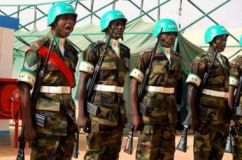Darfur’s UN force could be same troops in different hats
May 22, 2006 (AL-FASHER) — If a United Nations force takes over from African Union (AU) peacekeepers in the troubled Sudanese region of Darfur all they need do is exchange their green berets for blue ones.
 For it looks like the UN force, if deployed, will be the existing African outfit in new guise.
For it looks like the UN force, if deployed, will be the existing African outfit in new guise.
The contingent sent by the pan-African AU organisation is badly cash-strapped. But it says it could continue doing the job of providing security in this war-torn region if given the resources at the disposal of the UN.
“We don’t have enough vehicles, we don’t get paid regularly,” complained an NCO. “With the UN here our mission will be more stable.”
The 7,000-strong mission has been deployed to end conflict between local rebels and Khartoum-directed government forces in league with local militias. It finally decided in March it must give up, asking the UN to replace it.
The Sudan government previously refused to allow the deployment of UN troops in Darfur without a peace accord with the rebels.
But now that hurdle is considered practically cleared after a peace accord signed in Nigeria this month, it is only a matter of time before the Khartoum government gives the green light to the UN, say experts.
“The AU force is already on the ground and its soldiers are from countries in the UN,” said an AU officer. “All we’ll need to do is change the signs on our trucks and put on blue berets.”
“But it’s essential for the UN to take over officially, because it has more experience and more resources than the AU,” added the officer, who wished to remain anonymous.
And one western diplomat based in the Sudanese capital Khartoum said of the UN mission sought particularly by the United States, “it won’t be western. It will be African.”
The African Union which provides the present troops is an international organisation linking 53 African states, set up in 2002 as successor to the amalgamated African Economic Community (AEC) and the Organisation of African Unity (OAU).
Its purpose is to promote African democracy, human rights and a sustainable economy, especially by curbing intra-African conflicts.
The AU force here, largely financed by the US, Canada and the European Union, has a mandate until September, but has already set up logistics for UN operations.
“The advantage in Darfur is that the UN won’t have to start from scratch,” said a diplomat.
Things are constantly humming at Al-Fasher where the AU has its main encampment. Patrols, recognisable by white-painted vehicles bearing AU insignia, quarter the territory to check the security situation.
Local Sudanese greet them and village chiefs welcome officers who have already become familiar faces in a new climate of confidence built up in recent months.
The AU force, first deployed in 2004,has been playing the role of mediator between the Sudanese government in Khartoum and rebels demanding a fairer share of reserves of natural welath in this region torn by more than three years of conflict claiming some 300,000 lives and leaving 2.4 million homeless.
War broke out in 2003 when rebel groups revolted against what they said was the political and economic marginalization of the region’s black African ethnic groups by the Arab-dominated regime in Khartoum.
The government responded by unleashing the Janjaweed militia, a force of horse-mounted gunmen blamed for atrocities including rape and the burning of villages.
The main rebel group known as the Sudanese Liberation Movement (SLM) signed a peace accord on May 5 with the Khartoum government. Two other groups have resisted signing but have come under intense international pressure.
The AU force has succeeded in achieving contacts even with the recalcitrant groups.
“We’ve got very good relations with the African soldiers,” said self-styled General Tarrada, a leader of an SLM splinter group encountered some 70 kilometres (40 miles) west of Al-Fasher.
But the prospect of a UN deployment still has to be explained to local Darfur people, most of them Muslims. Many, especially supporters of the Khartoum regime, fear an American-style invasion like that in Iraq.
“We are against a UN presence,” said Abdallah Jouzou, mayor of Kouma in pro-government territory 80 kilometres (50 miles) from Al-Fasher.
“The African Union has helped to settle the conflict in Darfur and it remains the only solution,” he said.
But when an AU officer explained to him that the new UN force would be mainly African, Jouzou looked relieved.
“In that case, it’s fine,” he agreed.
(ST/AF)
